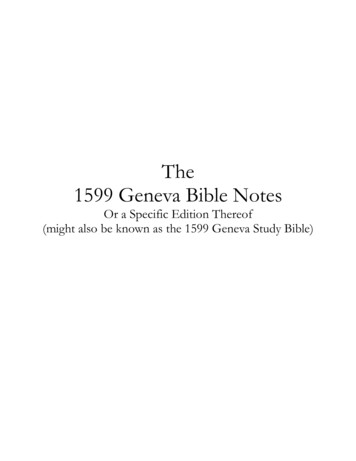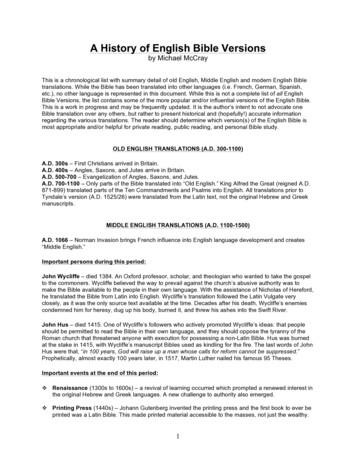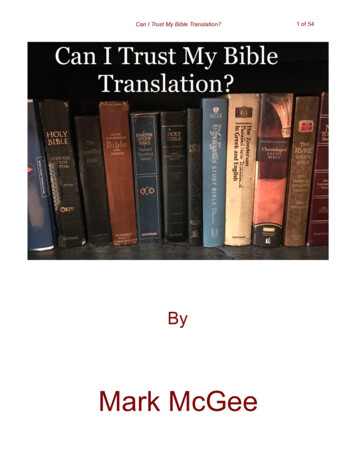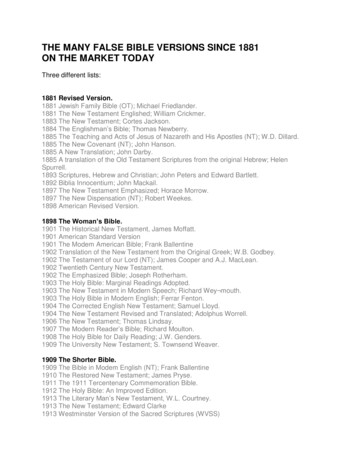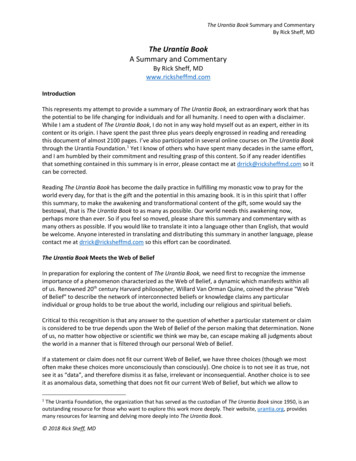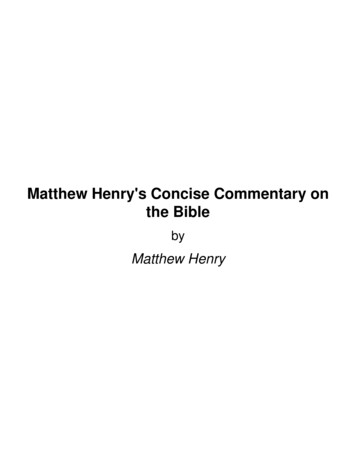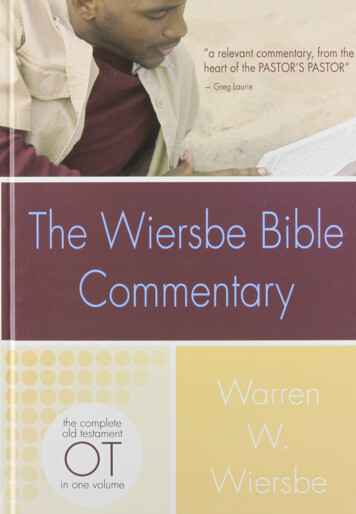
Transcription
The Wiersbe BibleCommentary
The Wiersbe BibleCommentarythe completeold testamentOTin one volumeWarrenW.Wiersbe
THE WIERSBE BIBLE COMMENTARY: OLD TESTAMENTPublished by David C. Cook4050 Lee Vance ViewColorado Springs, CO 80918 U.S.A.David C. Cook Distribution Canada55 Woodslee Avenue, Paris, Ontario, Canada N3L 3E5David C. Cook U.K., Kingsway CommunicationsEastbourne, East Sussex BN23 6NT, EnglandDavid C. Cook and the graphic circle C logoare registered trademarks of Cook Communications Ministries.All rights reserved. Except for brief excerpts for review purposes,no part of this book may be reproduced or used in any formwithout written permission from the publisher.Bible permissions information appears on page 1535 of the commentary.LCCN 2007934008ISBN 978-0-7814-4540-5 2007 Warren W. WiersbeFirst edition titled The Bible Exposition Commentary by Victor Books , 2003 Cook Communications Ministries, ISBNs 0-78143-481-5, 0-78143-531-5, 0-78143-530-7.Cover Photo: Digital Vision / Getty ImagesCover Design: Morris & WinrowPrinted in ItalySecond Edition 20071 2 3 4 5 6 7 8 9 10073107
CO N T E N T onomyJoshuaJudgesRuth1 Samuel2 Samuel and1 Chronicles1 Kings2 Kings and2 ChroniclesEzraNehemiahEstherJobPsalms1 Samuel2 Samuel1 Kings2 Kings1 Chronicles2 siastesSong seaJoelAmosObadiahProverbsEcclesiastesSong of 1523
FTO R E W O R Dhe Wiersbe Bible Commentary had a modest beginning in 1972 when Victor Books published my commentary on 1 John and called it Be Real. Nobody remembers who namedthe book, but for me it was the beginning of three decades of intensive Bible study as Iwrote additional commentaries, all of them falling under the new “Be” series. It took twentythree books to cover the New Testament, and they were published in two bound volumes in1989. Then I started the Old Testament “Be” series; and Be Obedient, on the life of Abraham,was published in 1991. There are now forty-two books available in the entire series, and compiled together to create the Wiersbe Bible Commentary, this publication represents theculmination of over thirty years of joyful work. During this time I was writing books for several publishers, but writing the next “Be” book was always at the top of my agenda.I owe a great debt of gratitude to the editorial staff for their encouragement and cooperation these many years, including Mark Sweeney, Jim Adair, Lloyd Cory, and Greg Clouse.Greg was always faithful to “shepherd” me through book after book, and I appreciate hisfriendship and ministry more and more with each passing year. Every author should be as fortunate as I’ve been to work with such dedicated, skillful people who always take a personalinterest in their authors. To the best of my knowledge, during these years we’ve ministeredtogether, we’ve never had a cross word or a serious misunderstanding.I especially want to thank the Lord for His kindness and mercy in allowing me to ministerin this way through the printed page. I can think of many of my friends who could have donea far better job than I in this series, but the Lord graciously gave the privilege to me. He alsogave me the wisdom and strength to get each book written on time—and sometimes ahead oftime—in the midst of a very busy life as a husband and father, a pastor, a radio Bible teacher,a seminary instructor, and a conference speaker.This leads me to say that I couldn’t have done it without the loving care of my wife, Betty.She manages our household affairs so well and takes such good care of me that I’ve always hadthe time needed for studying and writing. When I started this series, our four children wereall at home. Now they’re all married, and my wife and I have many wonderful grandchildren!Time flies when you’re checking proofs!The numerous readers of the “Be” series have been a great source of encouragement to me,even when they have written to disagree with me! I have received letters from many parts ofthe world, written by people in various walks of life, and they have gladdened my heart. Unlessa writer hears from readers, the writing becomes a one-way street; and he or she never knowsif that writing did anybody any good. I want to thank the pastors, missionaries, Sunday school
Warren Wiersbeteachers, and other students of the Word, who have been kind enough to write. We couldcompile a book of letters telling what God has done in the lives of people who have studiedthe “Be” series. To God be the glory!As I close, there are some other people whom ought to be thanked: Dr. Donald Burdicktaught me New Testament at Northern Baptist Seminary and showed me how to study theWord of God. Dr. Lloyd Perry and the late Dr. Charles W. Koller both taught me how to“unlock” a Scripture passage and organize an exposition that was understandable and practical. I recommend their books on preaching to any preacher or teacher who wants to organizematerial better.For ten happy years, I was privileged to pastor the Calvary Baptist Church in Covington,Kentucky, just across the river from Cincinnati. One of my happy duties was writing Biblestudy notes for “The Whole Bible Study Course,” which was developed by the late Dr. D. B.Eastep, who pastured the church for thirty-five fruitful years. I can’t think of a church that hasa greater love for the Bible or a deeper hunger for spiritual truth than the dear people ofCalvary Baptist. The “Be” series is, in many respects, a by-product of Dr. Eastep’s kindness insharing his ministry with me, and the church’s love and encouragement while I was their pastor. I honor his memory and thank God for their continued friendship and prayer support.Now, to you who study God’s Word with me, “I commend you to God, and to the wordof His grace, which is able to build you up, and to give you and inheritance among all themwho are sanctified” (Acts 20:32).—Warren W. Wiersbe8
GE N E S I gesRuth1 Samuel2 Samuel1 Kings2 Kings1 Chronicles2 siastesSong seaJoelAmosObadiahOUTLINECONTENTSKey theme: BeginningsKey verse: “In the beginning God ”(1:1)Genesis 1:1I. GOD CREATES THE UNIVERSE (1)II. ADAM AND EVE (2—5)A. The garden—2B. The fall—3C. The consequences of the fall—4—5III. NOAH AND HIS FAMILY (6:1—11:9)A. The flood—6—7B. The new earth—8C. The covenant—9D. The nations—10E. The tower of ggaiZechariahMalachi10BC: Before CreationGenesis 114When God Speaks, Something HappensGenesis 218First Things FirstThis Is My Father’s World—Or Is It?Genesis 326Perils in ParadiseGenesis 4:1–2431In Center Stage—CainGenesis 4:25—6:834When the Outlook Is Bleak, Try the UplookGenesis 6:9—7:2437One Man’s Faith, One Man’s FamilyIV. ABRAHAM AND SARAH (11:10—25:11)The beginning of the Hebrew nationGenesis 8V. ISAAC AND REBEKAH (25:12—28:22)Genesis 9:1–1741The God of New Beginnings45To Life! To Life!VI. JACOB AND HIS FAMILY (29:1—38:30)The building of the Hebrew nationVII.JOSEPH AND HIS MINISTRY (39:1—50:26)The protecting of the Hebrew nationNote the ten “generations” in Genesis: the heavens and earth(1:1—2:46); Adam (5:1–6:8); Noah (6:9—9:29); Shem,Ham, and Japheth (10:1—11:9); Shem (11:10–26); Terah(11:27—25:11); Ishmael (25:12–18); Isaac (25:19—35:29);Esau (36:1—37:1); Jacob (37:2—50:26)Genesis 9:18—10:3248The Rest of the StoryGenesis 1152Caution—God at WorkReview of Genesis 1—1155Back to BasicsGenesis 11:27—12:957A New BeginningGenesis 12:10—13:1860Famines, Flocks, and FightsGenesis 14Faith Is the Victory63
GenesisGenesis 1566Genesis 32—3410869Genesis 35—36113The Dark Night of the SoulGenesis 16Beware of Detours!Genesis 17You Can Go Home Again72What’s in a Name?Genesis 18—1975798286899295100A Masterpiece in PiecesGenesis 29—31Genesis 42—43124Genesis 44—45129Genesis 46—48133Genesis 49136The Family with at FutureLike Father, Like Son—AlmostGenesis 27—28120Grandfather Knows Best“A Time to Die’’Genesis 25—26Genesis 39—41Truth and ConsequencesHere Comes the Bride!Genesis 23; 25:1–11120When Dreams Come TrueThe Greatest Test of AllGenesis 24Genesis 38The Lord Makes the Difference“A Time to Weep, a Time to Laugh”Genesis 22116Judah and TamarAbraham the NeighborGenesis 21:1–21; Galatians 4:21–31Genesis 37Enter the HeroSo As by FireGenesis 20; 21:22–34Catching Up with YesterdayGenesis 50140Three CoffinsBe Authentic:A Survey and a Summary144104Disciplines and DecisionsCHAPTER ONEGenesis 1:1BC: BEFORE CREATIONI.GOD CREATES THE UNIVERSE (1)n spite of its name “Genesis,” which means “beginning,” and in spite of its position as the first book inthe Bible, the book of Genesis isn’t the beginning ofeverything. Genesis 1:1 reminds us, “In the beginningGod.” So, before we study the basics that are laid downin Genesis 1—11, let’s acquaint ourselves with whatGod did before what’s recorded in Genesis. After that,we’ll examine what He did that’s recorded in Genesis,and finally, what occurred after Genesis. This will giveus the kind of broad overview we need to study the restof God’s revelation in the Bible.IBefore Genesis: redemption plannedWhat was happening before God spoke the universeinto existence? That may seem like an impracticalhypothetical question, like “How many angels canstand on the point of a pin?” but it isn’t.1 After all, Goddoesn’t act arbitrarily, and the fact that He createdsomething suggests that He must have had some magnificent purposes in mind. What, then, was thesituation before Genesis 1:1, and what does it teach usabout God and ourselves?God existed in sublime glory. God is eternal; He10has neither beginning nor ending. Therefore, He istotally self-sufficient and needs nothing more thanHimself in order to exist or to act. “God has a voluntary relation to everything He has made,” wrote A. W.Tozer, “but He has no necessary relation to anythingoutside of Himself.”2 God needs nothing, neither thematerial universe nor the human race, and yet He created both.If you want something to boggle your mind, meditate on the concept of the eternal, that which hasneither beginning nor ending. As creatures of time, youand I can easily focus on the transient things aroundus, but it’s difficult if not impossible to conceive of thatwhich is eternal.3 Contemplating the nature and character of the Triune God who always was, always is, andalways will be, and who never changes, is a task thatoverwhelms us. “In the beginning God.”Moses wrote, “Before the mountains were born oryou brought forth the earth and the world, from everlasting to everlasting you are God” (Ps. 90:2 niv).Frederick Faber expressed it like this:Timeless, spaceless, single, lonely,4Yet sublimely Three,Thou art grandly, always, onlyGod in unity!5“Process theology,” an old heresy in modern dress,affirms a “limited god” who is in the process of
Genesisbecoming a “greater” god. But if God is God, as weunderstand the word, then He is eternal and needsnothing; and He is all-knowing, all-powerful, andeverywhere present. In order to have a “limited god,”you must first redefine the very word “God,” becauseby definition God cannot be limited.Furthermore, if God is limited and “gettinggreater,” then what power is making Him greater? Thatpower would be greater than “God” and therefore beGod! And wouldn’t that give us two gods instead ofone?6 But the God of the Bible is eternal and had nobeginning. He is infinite and knows no limitations ineither time or space. He is perfect and cannot“improve,” and is immutable and cannot change.The God that Abraham worshipped is the eternalGod (Gen. 21:33), and Moses told the Israelites, “Theeternal God is your refuge, and underneath are theeverlasting arms” (Deut. 33:27 niv). Habakkuk saidthat God was “from everlasting” (Hab. 1:12, and see3:6), and Paul called Him “the everlasting [eternal]God” (Rom. 16:26; see 1 Tim. 1:17).The divine Trinity was in loving communion.“In the beginning God” would be a startling statementto a citizen of Ur of the Chaldees where Abraham camefrom, because the Chaldeans and all their neighborsworshipped a galaxy of greater and lesser gods and goddesses. But the God of Genesis is the only true Godand has no “rival gods” to contend with, such as youread about in the myths and fables from the ancientworld. (See Ex. 15:1; 20:3; Deut. 6:4; 1 Kings 8:60; 2Kings 19:15; Ps. 18:31.)This one true God exists as three Persons: God theFather and God the Son and God the Holy Spirit. (SeeMatt. 3:16–17; 28:18–20;7 John 3:34–35; 14:15–17;Acts 2:32–33, 38–39; 10:36–38; 1 Cor. 12:1–6; 2 Cor.13:14; Eph. 1:3–14; 4:1–6; 2 Thess. 2:13–14; Titus3:4–6; 1 Peter 1:1–2.) This doesn’t mean that one Godmanifests Himself in three different forms, or thatthere are three gods; it means that one God exists inthree Persons who are equal in their attributes and yetindividual and distinct in their offices and ministries.As the Nicene Creed (AD 325) states it, “We believe inone God—And in one Lord Jesus Christ, the Son ofGod, begotten of the Father, light of light, very God ofvery God, begotten, not made, being of one substancewith the Father—And in the Holy Ghost.”I once heard a minister open a worship service bypraying, “Father, thank You for dying for us on thecross.” But it was God the Son, not God the Father,who died for sinners on the cross, and it is God theHoly Spirit who convicts lost sinners and brings themto repentance and salvation. To scramble and confusethe Persons of the divine Godhead is to change what istaught in Scripture, and this is a dangerous thing to do.The doctrine of the Trinity wasn’t clearly revealed inthe Old Testament, because the emphasis in the OldTestament is that the God of Israel is one God, uncreated and unique, the only true God. Worshipping thefalse gods of their neighbors was the great temptationand repeated sin of Israel, so Moses and the prophetshammered away on the unity and uniqueness of Israel’sGod. Even today, the faithful Jewish worshipper recites“The Shema” each day: “Hear [shema], O Israel, theLord our God, the Lord is one! You shall love the Lordyour God with all your heart, with all your soul, andwith all your might” (Deut. 6:4–5 nkjv). The Godrevealed in Scripture has no peers and no rivals.But the Old Testament does give glimpses and hintsof the wonderful truth of the Trinity, a truth thatwould later be clearly revealed in the New Testamentby Christ and the apostles. The “let us” statements inGenesis (Gen. 1:26; 3:22; 11:7; see also Isa. 6:8) suggest that the Persons of the Godhead worked togetherin conference, and the many instances when “the angelof the Lord” appeared on the scene indicate the presence of the Son of God. (See Gen. 16:7–11; 21:17;22:11, 15; 24:7; 40; 31:11; 32:24–20; Ex. 3:1–4 withActs 7:30–34; 14:19; 23:20–26; 32:33—33:17; Josh.5:13ff.; Judg. 2:1–5 and 6:11ff.)Messiah (God the Son) speaks about Himself, theSpirit, and the Lord (Father) in Isaiah 48:16–17 and61:1–3, and Psalm 2:7 states that Jehovah has a son.Jesus applied verse 7 to Himself when He challengedHis enemies who did not accept Him as the Son ofGod (Matt. 22:41–46). In Genesis 1:2 and 6:3, theSpirit of God is distinguished from the Lord (Father),and this same distinction is found in Numbers 27:18;Psalm 51:11; Isaiah 40:13; 48:16; and Haggai 2:4–5.Though the word “trinity” is nowhere used in theBible, the doctrine is certainly there, hidden in the OldTestament and revealed in the New Testament. Doesthis profound and mysterious doctrine have any practical meaning for the believer today? Yes, because thethree Persons of the Godhead are all involved in planning and executing the divine will for the universe,including the plan of salvation.The divine Trinity planned redemption. Thewonderful plan of redemption wasn’t a divine afterthought, for God’s people were chosen in Christ“before the foundation of the world” (Eph. 1:4; Rev.17:8) and given by the Father to the Son both tobelong to His kingdom (Matt. 25:34) and to share Hisglory (John 17:2, 6, 9, 11–12, 24). The sacrificial deathof the Son wasn’t an accident, it was an appointment(Acts 2:23; 4:27–28), for He was “slain from the foundation of the world” (Rev. 13:8).In the counsels of eternity, the Godhead determined to create a world that would include humansmade in the image of God. The Father was involved inCreation (Gen. 1:1; 2 Kings 19:15; Acts 4:24), but sowere the Son (John 1:1–3, 10; Col. 1:16; Heb. 1:2)and the Holy Spirit (Gen. 1:2; Ps. 104:30). God didn’tcreate a world because He needed anything but that Hemight share His love with creatures who, unlike theangels, are made in the image of God and can respondwillingly to His love.The Godhead determined that the Son would cometo earth and die for the sins of the world, and Jesus11
Genesiscame to do the Father’s will (John 10:17–18; Heb.10:7). The words Jesus spoke were from the Father(John 14:24), and the works He did were commissioned by the Father (5:17–21, 36; Acts 2:22) andempowered by the Spirit (10:38). The Son glorifies theFather (John 14:13; 17:1, 4) and the Spirit glorifies theSon (16:14). The Persons of the Holy Trinity worktogether to accomplish the divine will.According to Ephesians 1:3–14, the plan of salvation is Trinitarian: we are chosen by the Father (vv.3–6), purchased by the Son (vv. 7–12), and sealed bythe Spirit (vv. 13–14), and all of this is to the praise ofGod’s glory (vv. 6, 12, 14).8 The Father has givenauthority to the Son to give eternal life to those He hasgiven to the Son (John 17:1–3). All of this was plannedbefore there was ever a world!It’s important to see that all three Persons in theGodhead share in the salvation of lost sinners. As far asGod the Father is concerned, I was saved when He graciously chose me in Christ before the foundation of theworld, but I knew nothing about divine election untilafter I was converted.9 As far as God the Son is concerned, I was saved when He died for me on the cross,and I knew that great truth from the earliest days of mylife. But as far as God the Holy Spirit is concerned, Iwas saved in May 1945 when the Spirit of God convicted me and I trusted Jesus Christ. Then what Godhad planned from eternity all fell into place in my life.Spiritual birth is something like human birth: youexperience it but it takes time to understand it! Afterall, I wouldn’t know my own birthdate if somebodyhadn’t told me. It’s after we’ve been born into God’sfamily that the wonder of it all is revealed to us fromthe Word, and then we want to share it with others.When you seek to fathom the depths of the divineeternal counsels, you will be overwhelmed. But don’tbe discouraged, for over the centuries, good and godlyscholars have disagreed in their speculations and conclusions. One of my seminary professors used toremind us, “Try to explain these things and you maylose your mind; but try to explain them away, and youwill lose your soul.”Moses said it best: “The secret things belong to theLord our God, but the things which are revealedbelong to us and to our children forever, that we maydo all the words of this law” (Deut. 29:29 nkjv). Theimportant thing is not knowing all that God knows butdoing all God tells us to do. “For we know in part” (1Cor. 13:9).Genesis: redemption promisedWhen He wrote the Bible, God didn’t give us a ponderous theology book divided into sections labeled God,Creation, Man, Sin, and so forth. Instead, He gave us astory, a narrative that begins in eternity past and endsin eternity future. It’s a story about God and His dealings with all kinds of people and how they respondedto His Word. As we read these narratives, we learn agreat deal about God, ourselves, and our world, and we12discover that our own personal story is found somewhere in the pages of Scripture. If you read longenough and honestly enough, you will meet yourself inthe Bible.In our versions of the Bible, there are fifty chaptersin Genesis, but the original Hebrew text isn’t divided.After describing the creation (1:1—2:3), Moses listedeleven “generations” that comprise the Genesis narrative: the heavens and the earth (2:4—4:26); Adam(5:1—6:8); Noah (6:9—9:29); Noah’s sons, Shem,Ham, and Japheth (10:1—11:9), with an emphasis onShem, father of the Semites (11:10–26); Terah, fatherof Abraham (11:27—25:11); Ishmael (25:12–18);Isaac (25:19—35:29); Esau (36:1–8), who is alsoEdom (36:9—37:1); and Jacob (37:2—50:26). Theseare the individuals presented in Genesis.The first eleven chapters of Genesis deal withhumanity in general and focus on four great events: creation (1—2), the fall of man and its consequences(3—5), the flood (6—9), and the rebellion at Babel(10—11). The rest of Genesis focuses on Israel in particular (12—50) and recounts the lives of four greatmen: Abraham (12:1—25:18), Isaac (25:19—27:46),Jacob (28—36), and Joseph (37—50).10 We call thesemen the “patriarchs” because they were the foundingfathers of the Hebrew nation.As you study Genesis, keep in mind that Mosesdidn’t write a detailed history of each person or event.He recorded only those things that helped him achievehis purpose, which was to explain the origin of things,especially the origin of the Jewish nation. Genesis 1—11 is a record of failure, but with the call of Abraham,God made a new beginning. Man’s sin had broughtGod’s curse (3:14, 17; 4:11), but God’s graciouscovenant with Abraham brought blessing to the wholeworld (12:1–3).You will also notice in the Genesis record that whenman does his worst and reaches his lowest, God giveshim a new beginning. Dr. G. Campbell Morgan saidthat the cycle in Genesis is “generation, degeneration,and regeneration.”11 Cain killed Abel, but God gaveSeth to continue the godly line. The earth became violent and wicked, so God wiped out humanity butchose Noah and his family to carry on His work. Outof pagan Ur of the Chaldees, God called Abraham andSarah and gave them a son, Isaac, and the future ofGod’s plan of salvation rested with that son. Isaac andRebekah had two sons, Esau and Jacob, but Godrejected Esau and chose Jacob to build the twelve tribesof Israel and inherit the covenant blessings.In other words, from beginning to end, Genesis isthe story of God’s sovereign will and electing grace.This doesn’t suggest that the persons in the story weremere robots, because they made mistakes and eventried to thwart God’s plans. But whenever people resisted God’s rule, He overruled and accomplished Hisdivine purposes anyway. “The counsel of the Lordstands forever, the plans of His heart to all generations”(Ps. 33:11 nkjv).
GenesisWhat begins in Genesis is developed throughoutthe Bible and then finds its fulfillment in the book ofRevelation, as you can see from this summary:GenesisRevelationThe first heaven andearthThe new heaven andearthThe first garden;the Tree of LifeguardedThe “garden city” andthe Tree of Life availableThe first marriageThe last marriage,the marriage ofthe LambSatan tempts Eve to sin Satan thrown into thelake of fireDeath enters the scene“No more death”Babylon builtBabylon destroyedThe Redeemer prom- The Redeemer reignsisedThere are many more comparisons and contrastsbetween these two books, but this gives you some ideaof how important Genesis is to an understanding ofGod’s program and the rest of Scripture.After Genesis: redemption accomplishedGod revealed His great plan of salvation gradually.First, He gave a promise (Gen. 3:15), the first salvationpromise found in the Bible. It’s the promise of aRedeemer who would be born of a woman, defeatSatan, and bring salvation to mankind. The promisedSavior would be a man and not an angel and wouldsave humans and not fallen angels (Heb. 2:5–18).Where would this promised Redeemer come from?Genesis 12:1–3 answers that question: the Redeemerwill be a Jew, from the people of Abraham. Through amiracle of God, Abraham and Sarah had Isaac, andIsaac was the father of Jacob. But Jacob had twelve sonswho founded the twelve tribes of Israel. Which of themwould give the world the Savior? Genesis 49:10 tells us:the Redeemer will come from the tribe of Judah.The book of Exodus tells how God built the greatHebrew nation as they suffered in the land of Egyptand then delivered them by His great power. Theyshould have claimed their inheritance in Canaan, butin unbelief they disobeyed God and ended up wandering forty years in the wilderness (Num. 13—14).Joshua led the new generation into the land and thereestablished the nation.After the tragic era of the rule of the judges and thereign of Saul, recorded in Judges and 1 Samuel, Godanointed David as king and revealed that the promisedRedeemer would come from David’s family (2 Sam. 7).He would not only be “the son of David,” but hewould be born in Bethlehem, the city of David (Mic.5:2). Through Isaiah the prophet, God announced thatthe Redeemer would be born of a virgin in a miraculous way (Isa. 7:14; see Luke 1:26–38).Of course, throughout the Old Testament ages,Satan did all he could to thwart the plans of God. Cainbelonged to the devil (1 John 3:12) and killed hisbrother Abel, but God gave Seth to continue the godlyline (Gen. 4:25–26). During the flood, God preservedNoah and his family, and from the family of Shem,Abraham was born, the father of the Hebrew nation.On at least four occasions, the godly line wasthreatened with extinction. Twice Abraham lied aboutSarah his wife and she was taken by pagan rulers(12:10–20; 20:1ff.), and his son Isaac committed thesame sin and jeopardized his wife Rebekah (26:6–16).During the dark days of the later Hebrew monarchy,the wicked Queen Mother Athaliah had all the royalsons slain, but one little prince, Joash, was rescued tocontinue the Davidic line (2 Kings 11).How did it all end? “But when the fullness of thetime had come, God sent forth His Son, born of awoman, born under the law, to redeem those who wereunder the law” (Gal. 5:4–5 nkjv). The angelannounced to the shepherds, “For unto you is born thisday in the city of David a Savior, who is Christ theLord” (Luke 2:11).The promise had been fulfilled! And it all started inGenesis!Now let’s join Moses and read his magnificentinspired record of the creation of the heaven, the earth,and human life.Notes1 It’s doubtful that the ancient theologians ever asked this particular question, but the topic isn’t totally irrelevant. Angels arespirits and have no physical bodies, except temporarily whensent on special missions; so how do they occupy space?Thomas Aquinas discussed the matter in his SummaTheologica, so the question is important.2 A.W. Tozer, The Knowledge of the Holy (New York: Harper andBrothers, 1961), 39.3 Of course, every human being will exist forever, either inheaven or hell, but as far as this world is concerned, we’re allstrangers and pilgrims “only passing through.”4 “Lonely” doesn’t suggest that God needed friends. The wordmeans “solitary.”5 A.W. Tozer, The Christian Book of Mystical Verse (Harrisburg,Pa.: Christian Publications, 1963), 7.6 In our day, “process theology” grew out of the teachings of theBritish philosopher Alfred North Whitehead (1861–1947),and his disciple Charles Hartshorne gave it wide exposure.Process theology was popularized by Rabbi Harold S. Kushnerin his book When Bad Things Happen to Good People. Kushnerclaimed that God was too weak now to do anything aboutcancer, war, and the tragedies of life; but as we trust Him anddo good, we strengthen Him to do better. For the evangelicalpoint of view, see On Process Theology edited by Ronald H.Nash (Baker Book House, 1987), and my book Why Us?13
Genesis 1When Bad Things Happen to God’s People (Fleming H. Revell,1984).7 The conjunction “and” in the Christian baptismal formula isimportant, for it shows the equality of the Persons of theGodhead.8 The doctrine of divine election is not an excuse to not sharethe gospel with others. The same God who ordained the end—the salvation of the lost—has also ordained the means to theend, which is the witness of His people and their prayers forsuccess for His Word. God chooses people to salvation andthen calls them by His gospel (2 Thess. 2:13–14). The two gotogether. We don’t know who the elect are, and we have beenordered to take the gospel to the whole world (Mark 16:15;Acts 1:8).9 Dr. H.A. Ironside, for eighteen years pastor of Chicago’sMoody Church, used to illustrate this truth by describing adoor, over which hung a sign that read, “Whosoever will maycome.” Believing that, you walked through the door and weresaved. Then you looked back and read another sign hangingover the inside of the door: “Chosen in Christ before the foundation of the world.”10 These chapter divisions are arbitrary since there is an overlapping of generations in the narratives as there always is inhuman history. Technically, the “generations of Jacob” beginsat 37:2, but Jacob’s story starts much earlier and moves Isaacinto the background. There is no section labeled “the generations of Joseph” since Joseph is a part of the Jacob narrativewhich closes the book of Genesis.11 See Morgan’s The Analyzed Bible and Living Messages of theBooks of the Bible, both published by Fleming H. Revell.CHAPTER TWOGenesis 1WHEN GOD SPEAKS, SOMETHINGHAPPENSSome people call the president of the United States“the most powerful leader in the world,” but morethan one former president would disagree. Expresidents have confessed that their executive ordersweren’t always obeyed and that there wasn’t much theycould do about it.For example, during President Nixon’s first term inoffice, he ordered the removal of s
1989. Then I started the Old Testament “Be” series; and Be Obedient, on the life of Abraham, was published in 1991. There are now forty-two books available in the entire series, and com-piled together to create the Wiersbe Bible Commentary,this publication repres



